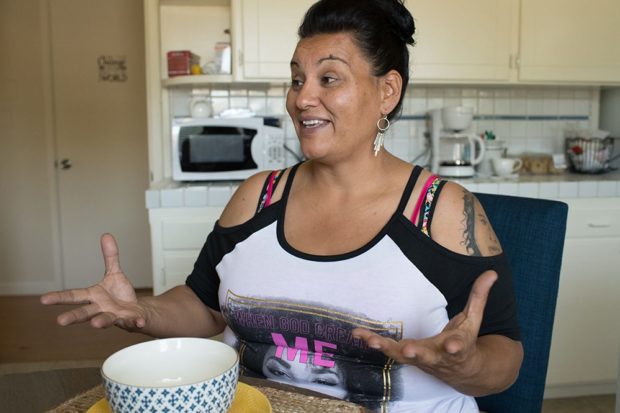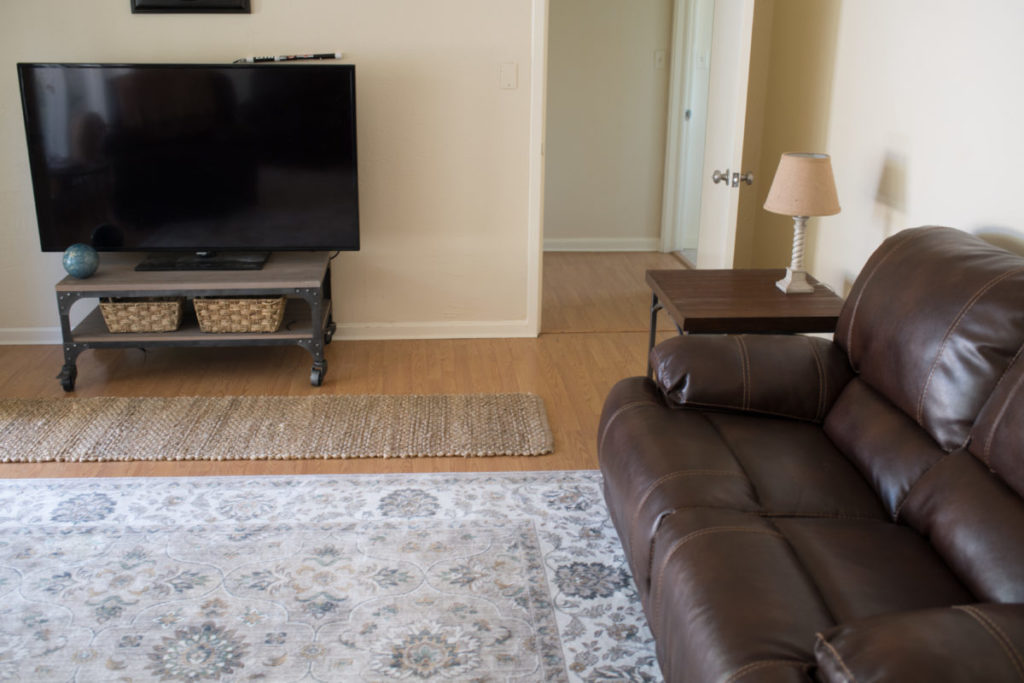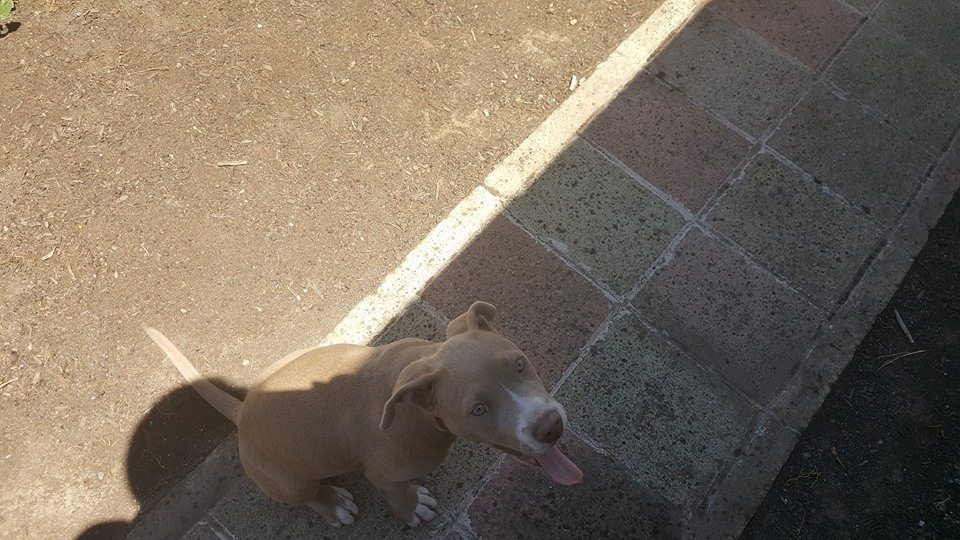
A Conversation with Homeless Advocate Dez Martinez
By Hannah Brandt
Walking up the front stoop lined with bougainvillea, through the driftwood wreathed door there is a warm glow of hominess. That is not a happy accident. Desiree “Dez” Martinez has worked hard to create a feeling of home with her new house.
This is not just any new home, and Martinez is not any typical proud new homeowner. This is a home for people experiencing homelessness, a place called We Are Not Invisible. “I’m going to provide everything here cost-free as a home, not an institution,” says Martinez. “This is a place where people can stay, work and save up to get their own place. I want to help people not just for one day but to get on with the rest of their lives. This is to be a place of hope and inspiration.”
She can house about eight formerly homeless clients here. The house will be stocked with food, clothing and hygiene products, all necessities that are hard to access while living on the street. Those people staying at the house will go out with her and her volunteers to hand out water and food to people still living on the street. She will have a few extra bikes and carts to use. “This ensures that everyone can participate, feel a sense of purpose and accomplishment.”
Martinez says that Fresno needs to have somewhere for families because shelters break up people by women, men and children. She knows this firsthand as someone who has experienced homelessness herself. She says she is now in a place to offer a home to the homeless, to people who are just like any of us, only less fortunate. The experience of homelessness is a process that takes your humanity away. She has dedicated the house to a street person who died last year named J.D. His picture is the first thing you see when you come in the door.

The most important thing to her is that the home not resemble the institutions where she spent time that were “like prisons with old jail bunk beds where you stand in line waiting for mystery food. I am a strong believer in going out to the homeless and talk to them, learn their names, treat them like people, not corral them all in a cattle line. It’s dehumanizing. It is time to end the criminalization of homelessness and break the cycle of institutionalization from shelters to prisons.”
There is a comfy living room, private bedrooms and a large kitchen that has room to prepare large meals family style and where families can cook for themselves. There will be laundry facilities where volunteers and clients will wash clothing for people still on the street. Martinez says this simple thing that most of us take for granted is vital. When she has handed out clothing, she has often found them thrown away once they got too dirty because street people have nowhere to wash themselves or their clothes.
The house has a backyard with a large patio where she has set up shaded chairs and a table. There is an area Martinez hopes to turn into a self-sustaining vegetable garden. She would like to have a greenhouse in the future and a shower truck for people still on the street. There is a breezeway inside that she will set up for arts and crafts and as for a meeting space for volunteers. The garage is already packed with clothing that she will organize on racks and shelves. She will pick up people and bring them to this community closet, not dump a box in front of people like happened to her.

Although she is quick to acknowledge that she has no special training in psychology or mental health, Martinez sees the house as a way to help people with depression and prevent suicide. Her personal experience with homelessness is a tremendous asset in helping people struggling with it now. She says there is much healing that happens just by talking to people. “We go all over the city, talking with the homeless to bridge the gap between the fortunate and forgotten community. You can’t always close your blinds and look away.”
“Everyone has struggles,” says Martinez. “Old crimes continue to be punished many years later. People have lost everything in the recession. Anything can happen to anyone. Many in our community are just one paycheck away from becoming homeless. People who have nothing often start living in their car and have no way to pay for their registration, so their car gets taken away. Then they have nowhere to stay. Once people are being taken from you, more and more, it leads to depression and suicidal thoughts.”
“So, few people stop to ask people living on the street if they’re okay. Even just one person believing in you makes such a difference.” Martinez says that when people just talked to her when she was homeless, asked her name and how she was doing, “that was like Christmas.”
There is a lot of mental, physical and emotional abuse toward the homeless. Many have PTSD, especially those who have been incarcerated. Survival is hard with no help or services—when you have to steal to eat or when you’re so depressed, ashamed and exhausted that it is hard to reach out for help. The ground or a park bench is hard to sleep on. You can never relax because you are always worried, not about the next day but rather about that minute, that second.

“Life on the street for women is uniquely difficult,” said Martinez. “When they are on their menstrual cycle they do not have a way to deal with it. A lot of women are attacked when they have to relieve themselves, a lot have been raped then. Many are too traumatized to go to certain areas even if they can get food there because of abuse they have suffered in that spot. If they file a report, there often is not any action. Some have even been mistreated by health service workers.”
We should not worry about whether a person is drug-free before we house them, Martinez says. “We need to give them a chance to feel human. When the wealthy go to rehab, it is like a resort; when the poor do, it’s like a prison. Many institutions have no privacy and people are constantly telling the homeless what to do.” When Martinez was at a women’s shelter, she had to ask men for a tampon. When people are treated that way, they would rather be on street.
Many community and government organizations work on beautifying cities, but homelessness continues to rise. Martinez says that when she was homeless she went to churches in Fresno and everyone turned her away. Shelters have limited number of beds. She says there are only 250 available beds in the city of Fresno, where as many as 3,000 people are experiencing homelessness. Many are on waiting lists.
On her Instagram and Facebook pages, Homeless in Fresno, Martinez gives street families a platform to tell their stories in their own voices. She also puts out calls for individual needs, everything from shoes or coats to transportation to the doctor. She recruits people to help her pass out water and serve food.

Morning is the hardest time for street people. “You are hungry and sore. People are yelling at you to move. Warm food and cold drinks are the best. In the Tower District, there is one place that will allow people to sit and have some water. Downtown has one other. But there are only a couple of streets where people are allowed to set up tents. In every other part of town, people are subject to arrest.”
Street people are eager to work any way they can. People experiencing homelessness have to learn to be resourceful. Some dig holes in the summer to keep cool or sleep on roofs or in trees. Affectionately called tree huggers, they will build platforms in trees to be less prone to attack than on the ground. People have created booby traps hooked up to alarms to wake themselves if someone tries to hurt or steal from them. Many keep pet dogs to alert them, too. People also sleep cuddled up together for warmth and companionship. “The dogs always get fed first,” says Martinez. “I’ve never seen any street person abuse an animal.”
“I have met so many caring people that I now have a huge extended family,” said Martinez. “They’ve helped me through my social anxiety due to PTSD. They have been the best counselors. For a long time, I couldn’t be around ‘normal people’ because I would have anxiety attacks. This is what happens when you go through trauma. It helped me so much just to go out there and help people who have helped me. It renewed my spirit. Street people don’t judge; they accept you as you are. It really is a family environment. People feed each other. People fed me.”
Martinez says organizations do not need millions of dollars to do this work. She is doing this all [living] on $377 a month. “The community did this. This is a real community organization. I couldn’t do it without all the many donations I have received over the last year. This is not my thing alone. I used to think Fresno was a black hole of ‘No,” but I have found a lot of compassionate people here who are passionate about helping the homeless.”
Editor’s Note: To clarify, Martinez is able to live on $377 a month as an individual. She does not run the whole operation on $377 a month. We apologize for any misunderstanding due to the original wording of the article.
*****
Hannah Brandt is the editor of the Community Alliance newspaper. Follow her on Twitter and Instagram at @HannahBP2. Follow the paper on Facebook at Community Alliance Newspaper and on Twitter and Instagram @fresnoalliance.
